Rwanda is a country transforming and being reborn as an ICT-enabled nation. Emerging ICT entrepreneurs are expected to help develop the country and Africa as a whole, and a project is currently underway to make this aspiration a reality.
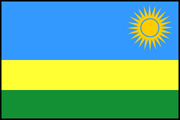
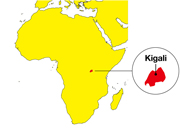
Republic of Rwanda
Name: Republic of Rwanda
Capital: Kigali
Currency: Rwandan franc
Population: 12.2 million (2017 World Bank)
Languages: Kinyarwanda, English, French, Swahili
Toward becoming the leading ICT country in Africa
ICT Entrepreneurs Leading Africa into the Future
In December 2018, eight teams of Rwandan entrepreneurs, ranging in age from 19 to mid-30s, gave enthusiastic presentations regarding new ICT businesses in the banquet hall of a luxury hotel in Kigali, the capital city of Rwanda. This was the graduation ceremony for the 250Startups program (see p.5), which is a part of the project started by JICA in November 2017 to strengthen the country's ICT sector and innovation ecosystem, especially for startups. Their message was warmly received by an audience of over 200 people, comprised of investors and others from the business community, as well as government personnel, including the Permanent Secretary of the Rwandan Ministry of ICT & Innovation.
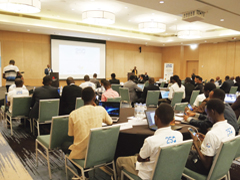
200 people attended the graduation from both within and outside Rwanda. Entrepreneurs and investors were also seen deep in discussion outside the venue.
These startup businesses were founded with the aim of utilizing ICT to solve the social challenges facing the nation. The businesses present included a distribution service app for directly linking producers with consumers, an app for detecting and identifying the location of leaks in water service pipes, and a paperless system for sharing information among agricultural cooperatives. Members of the audience participated in a lively Q&A session, asking questions such as "who is your target market?" and "how did you come up with the idea for this business?"
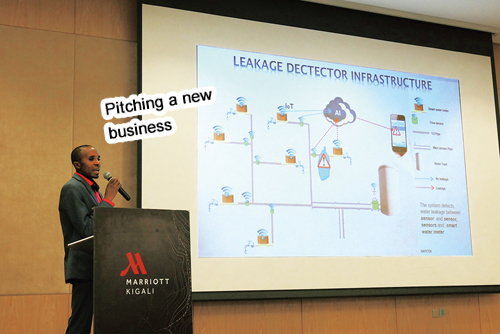
A presentation at the graduation, which also doubled as a pitch event for investors.
Twenty-eight startup companies applied to join the program in March 2018, from which eight were selected as the first batch to receive six-month-long support from JICA experts in a process called incubation (fostering of new businesses). The program offered them core skills such as management, legal knowledge, finance/accounting, and marketing.
Imani Bora, one of the selected entrepreneurs, developed an app for remotely controlling a chicken egg incubator in order to improve the supply of chickens in Rwanda, and help address the country's current reliance on imports. His presentation attracted much attention.
"In this program I learned various skills for making my business sustainable, such as how to create a budget and business plan. I also came to see the importance of talking directly with the farmers who are my clients, and customizing products to match their needs."
"This project is not about us creating 250 companies, but rather about creating a place within the country with a framework for efficiently fostering business," explains Atsushi Yamanaka, the JICA expert overseeing the project. "We also wanted the graduation to be a chance to find collaborators from Rwanda and overseas. I was watching the audience listening to the presentations, and I'm sure many thought 'this will really make a good business,'" he added.
It is important for the Rwandan government, and the related agencies and private enterprises promoting ICT, to create a support framework for startup companies that is not fully reliant on JICA. Furthermore, we see this developing not just in Rwanda, but also taking root in other countries throughout Africa.
What is "250Startups"?
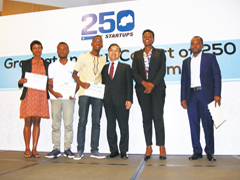
Diplomas were presented by Mr. Takayuki Miyashita, Ambassador of Japan to the Republic of Rwanda. In January 2019, five of the eight companies visited Japan and three visited Kenya for discussions with investors.
250Startups is a program that provides an environment in which entrepreneurs can concentrate on growing their businesses by offering them expertise in matters related to law, finance/accounting, business planning, marketing, equipment and materials (see concept diagram on the right). While the program does not provide financial support, it does provide entrepreneurs with the opportunity to meet potential investors at international conferences and other events. In addition to being the international calling code for Rwanda, 250 signifies the minimum number of outstanding startups the project aims to foster by 2025/26.
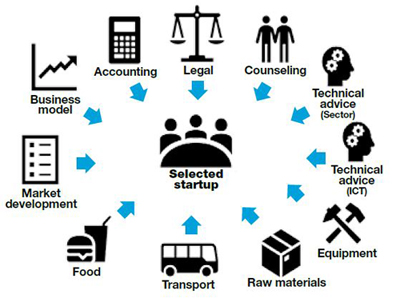
Company Name:
Hatch Plus
Developed an automated incubator, which can carry out monitoring of eggs and remote control operations using a smartphone and other devices. Company president Imani Bora (24) also works as a lecturer at IPRC Tumba. "Rwanda is reliant on imports for 80% of its chicken and eggs, so prices are high. When I became aware of this problem, I wondered if there was something that I could do about it, and so I developed this system."
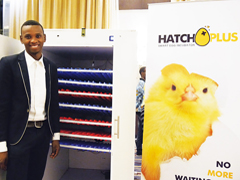
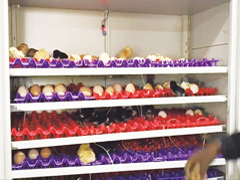
Company Name :
AKWA
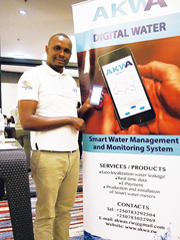
Developed a system for water supply companies whereby small sensors are installed in water service pipes, so that when a leak is detected the location is identified and an app notification is sent to a smartphone. "The amount of water used can also be monitored, so the system is compatible with electronic billing," says co-founder Kenneth Mwebesa.
Rwanda's Resolve to become an ICT-oriented Country
The 1994 civil war in Rwanda had a major impact on the economy. But now, 25 years down the track, the country is growing so quickly it has become known as the "miracle of Africa." The roots of this spectacular recovery can be found in the ICT industry.
At the end of the 1990s, in the midst of an information technology (IT) bubble that was enveloping the world, the UN and developed countries provided support to developing countries to make the most of ICT. Rwanda saw ICT as an important key to develop the country, and committed to formulating and implementing four 5-year ICT strategic plans for the period between 2001 and 2020.
However, during the first period in the 2000s, the IT bubble burst and the support of the international community came to a standstill; consequently, many developing countries had to suspend ICT-driven development. "Rwanda, however, was different and stayed the course," explains Mr. Yamanaka.
"Rwanda, a geographically small country, had always been poor in natural resources; agricultural production was limited, and it had a strong desire to use ICT as one of the keys to develop the country. Without relying on the international community and using only its own funds, the country is one of only a handful that persevered in installing a fiber optic network and continuing with digital development using its own resources. As a result, Rwanda established itself in Africa as an ICT-oriented country.
It was during this time that Japan extended a helping hand. Japan had suspended ODA since the outbreak of the internal conflict, but in 2005, JICA reopened their Office in Rwanda, and from 2007 they started to provide assistance to develop the curriculum for the Integrated Polytechnic Regional College of Tumba (IPRC Tumba), an institution that trains ICT technicians and practitioners.
Mr. Yamanaka has worked as an expert in the country since 2010 and has been active in providing support for the development of the Rwandan ICT strategy, as well as in the training of personnel. He provided support for the development of the private-sector federation ICT Chamber, and the kLab and Fab Lab incubators that support the fostering of young entrepreneurs. Mr. Yamanaka also acted as a coordinator for the ABE Initiative [1] in which young people are brought to Japan to get their master's degrees at a Japanese university, or to participate in an internship program.
Note
- [1]The ABE Initiative (the African Business Education Initiative for Youth) is a program that accepts outstanding young Africans with work experience as international students, and offers them opportunities to study at master's degree courses and experience internships at Japanese companies.
Sharing the Lessons from Japan in Rwanda
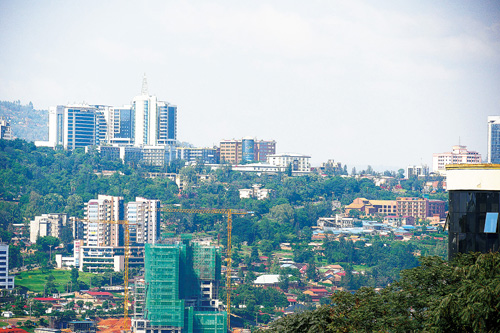
The number of high-rise buildings in the heart of Kigali is increasing year by year. The streets are clean with not even a piece of garbage, and the area is popular among visitors and international businessmen alike due to its high level of safety.
Among the young people currently active in the Rwandan ICT industry, many have studied in Japan under the ABE Initiative.
At Kobe Institute of Computing (KIC), which accepts many Rwandan exchange students, the "Program for Fostering Young ICT Personnel Centered in Kigali" grassroots technical assistance program is being run in cooperation with Kobe City. Students are taught using the Tankyu method advocated by KIC President Toshiki Sumitani. With the Tankyu method, students investigate the needs of society and then independently draw up and implement solutions to meet such needs.
"Although I thought about staying and working in Japan, the desire to return to my country and share the skills that I had learned in Japan and do something to contribute to my country proved stronger," says Yves Cyuzuzo, who teaches the Tankyu method while working at the software development company WiredIn in Kigali.
"The desire to do something for their country is strong among Rwandans," Mr. Yamanaka adds. "There are many who returned to Rwanda after the end of the civil war, and I often hear them say things like 'We're creating the future of our country. Never again will we allow a tragedy such as genocide to happen. Rwanda is going to change!' They have such strong feelings, they set high goals and act on them."
Geographically, Rwanda is located almost at the center of the African continent, and many people speak both English and French. This is why Mr. Yamanaka expects ICT innovation culture to spread throughout the rest of Africa in the future.
"Many challenges remain throughout the African continent, and there are many fields where development through the use of ICT is necessary. All the more reason, therefore, for them to come to Rwanda to obtain the latest information and make connections. That's why we are working hard to make Rwanda the center of innovation in Africa."
ICT Innovation Ecosystem Strengthening Project Specialist
Atsushi Yamanaka
"In August of this year, the seventh Tokyo International Conference on African Development (TICAD7) will be held in Yokohama. There, in addition to introducing the knowledge obtained through Rwanda's ICT innovation, we will endeavor to strengthen relationships between Japan and Rwanda on the private-sector level, so keep an eye out for it."
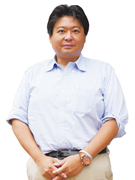
Telecom House
A Place of Dreams for Startups
Located in the heart of Kigali, Telecom House is home to ICT-related organizations and facilities, such as kLab, Fab Lab, the ICT Chamber, the Rwanda Information Society Authority (RISA), and the JICA project office, and serves as the central hub of the Rwandan ICT industry.
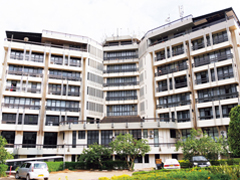
kLab
Established in 2012, the "K" in the name comes from the first letter of the word "knowledge." This innovation center, which supports the fostering of young entrepreneurs, etc., has already started more than 250 businesses. It is also used as a place where entrepreneurs can exchange information and hold meetings or workshops.
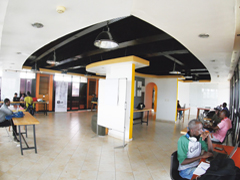
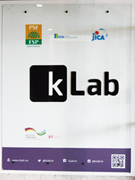
A free space for learning about IT
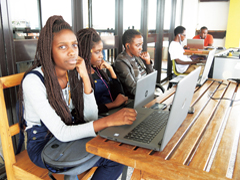
Many young people use this place for collecting information and learning, as they can use the internet at no cost just by registering.
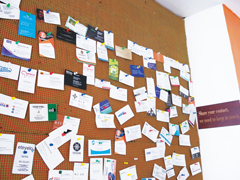
The countless number of business cards stuck to the wall helps facilitate sharing of contact details and strengthens relationships among people in business.
Fab Lab
Fab Lab was established in 2016 and takes the first three letters of its name from the word "fabrication." Now found throughout the world, the original concept for Fab Lab came from the 'spaces for creation' advocated by Neil Gershenfeld (a Massachusetts Institute of Technology professor). With 3D printers, NC (numerical control) machines, laser cutters, and other machine tools, almost anything can be made.
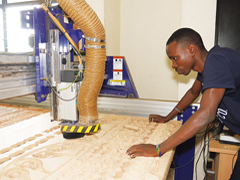
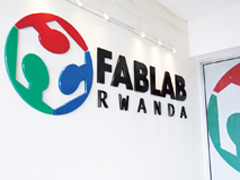
A creative space to form ideas
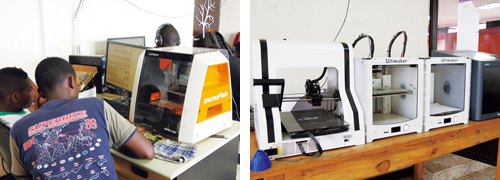
Tools such as 3D printers and laser cutters are available. Prototypes of devices required for ICT businesses can also be easily made.
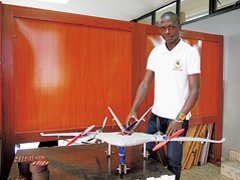
A young man who created a model aircraft using the machine tools at Fab Lab. The aircraft is said to have a range of 4 km, and he is planning to demonstrate the plane's performance at upcoming contests.




scroll